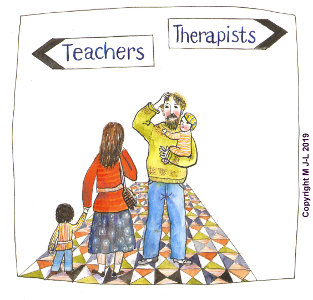Unhelpful confusion in early child and family support about the roles of teachers and therapists. Is the distinction between them invalid?
 ‘…who is best placed to help a baby or pre-school child who has very special needs acquire understanding and skills…? A teacher? A therapist? Both? Neither?
‘…who is best placed to help a baby or pre-school child who has very special needs acquire understanding and skills…? A teacher? A therapist? Both? Neither?
Comment by Peter Limbrick
In my working experience with babies and pre-school children who have very special needs, I have seen much confusion about what therapists do and what teachers do, and about what is education and what is therapy (i.e. paediatric physiotherapy, occupational therapy, speech & language therapy). When we resolve the confusion we can enhance children’s learning and quality of life, take some ‘appointments pressure’ off parents and create welcome flexibility in how paediatric therapists and pre-school teachers spend their time.
It is valid to use the term ‘education’ for babies and infants if we define it as ‘the acquisition of relevant understanding and skills’. Surely, this starts with babies at bath time and on a parent’s lap for rhymes and baby games and then with infants pulling socks off and playing with toys on the floor. Most of what typically-developing babies and infants learn in their first couple of years happens in these natural activities – playing, managing clothes, mealtime, bedtime, bath time and socialising in the family setting.
When we are helping a child who has very special needs and a multifaceted condition (multiple diagnoses of conditions that impact on learning) to drink from a cup at a tray or table, we need to consider such ‘therapy’ issues as posture, seating, reaching, grasp, swallowing and such ‘education’ issues as understanding the situation, attention, using pictures/signs/words to communicate choices, sequencing actions, responding to encouragement… (And we immediately come up against the confusion because communication is an important part of the work of speech & language therapists as well as teachers!)
The same issues apply in helping a child learn to manage undressing and dressing. The many elements of this include ones that therapists help with (posture, balance, movement, grasp) and ones that teachers help with (which clothes go where, necessary sequence – and conversations about colour, warmth, texture…).
So, who is best placed to help a baby or pre-school child who has very special needs acquire understanding and skills in these essential everyday activities? A teacher? A therapist? Both? Neither?
My argument is that when we are helping parents support their child’s new understanding and skills (a major part of early support), we do not necessarily need separate practitioners offering separate therapy and teaching assessments, programmes and appointments. This wastes time and resources for the family and practitioners and gives babies and pre-school children a very unnatural childhood.
The expertise we need (and these children do need a very high level of expertise) must come from people with relevant training and experience regardless of whether they are called teachers (home visiting, sensory specialists, nursery), therapists, psychologists, ‘portage’ workers or play workers. They must observe each child and then join their skills together into an action plan to help whatever natural activity is being focused on – eating, drinking, dressing, etc.
Whom have I missed out? Parents. Their knowledge and expertise is as important as that of any of the practitioners around the child. And it is parents’ right and responsibility to bring up their children so the role of practitioners is to help them as they help their children acquire understanding and skills. Parents will know which everyday activity is best to focus on – perhaps one currently causing them concern.
The responsibility of practitioners is to join their skills together into a whole-child plan to help each child in the chosen natural activity, and in this joining together, the words ‘therapy’, 'education, ‘teachers’ and 'therapists' evaporate into irrelevance and meaninglessness. Also, in this joining together, there can be more rational decisions about how many people are really needed to work directly with each child and parent. Probably fewer.
The idea that a child needs multiple separate interventions from a bunch of therapists and teachers to help her or him acquire new understanding and skills is an unfortunate hangover from last century.
Taking a fresh look at early child and family support (or early childhood intervention) can help us see why this therapist/teacher confusion has arisen. There are three main essential pillars in this early support: health, education and family support.
- Health is about the child’s survival, health, wellbeing and freedom from pain.
- Education is about the child’s understand, skills and wellbeing.
- Family support is about the family’s survival, resilience and quality of life.
Therapists are involved in the child’s survival, health, wellbeing and freedom from pain and in promoting new understanding and skills. Paediatric therapy therefore has an essential health component and an essential education component.
In this analysis, we have therapists and teachers around an individual child potentially doing the same things. This often results in duplication and overload. Once we see this, we can come to better arrangements about who needs to offer direct support to parents as they help their child acquire new understanding and skills. And then some therapists and teachers will be relieved of some pressure, children will have a better quality of childhood and many parents will breathe a sigh of relief.

Your comments welcome to This email address is being protected from spambots. You need JavaScript enabled to view it.

